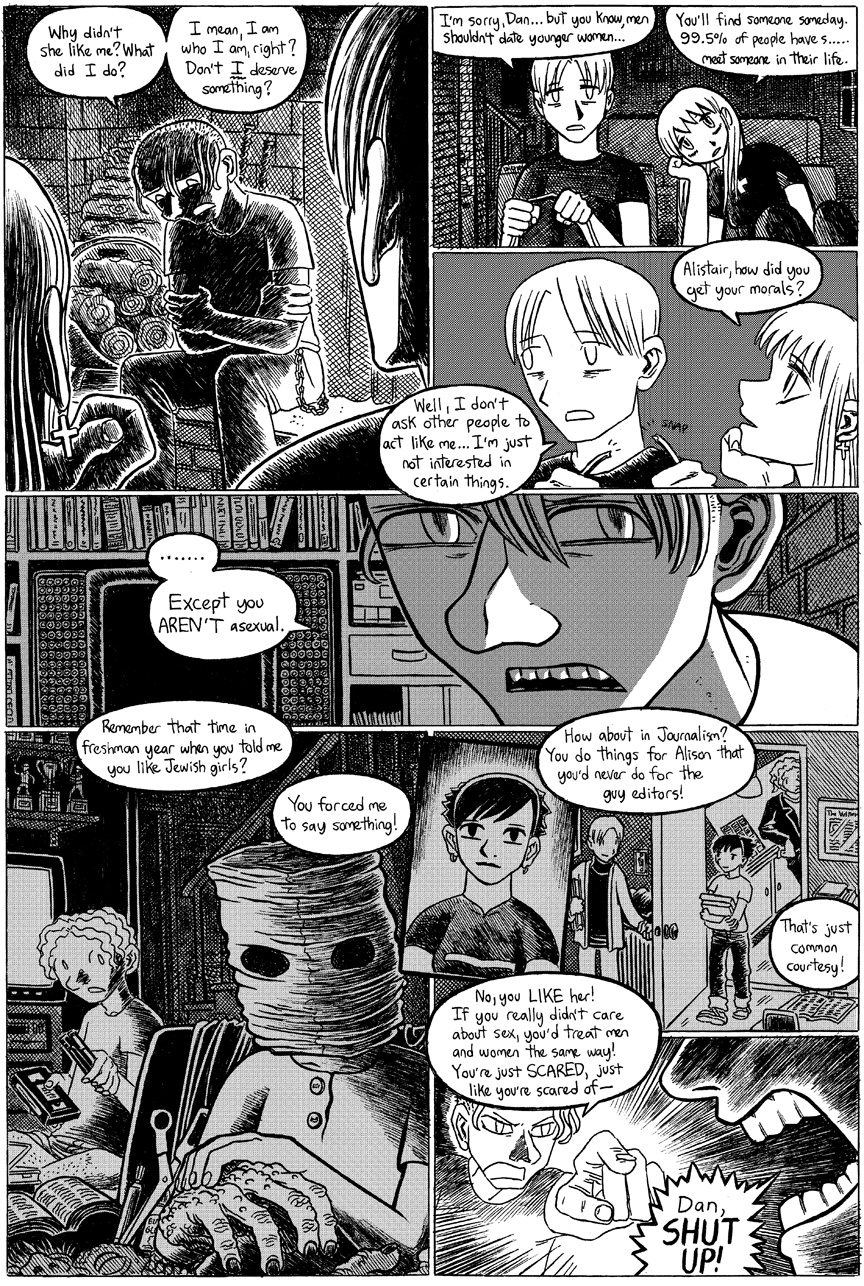The Stiff: Chapter 4: Page 168
I spent the weekend at Go Play NW, Seattle’s indy tabletop gaming/story games convention. I really enjoyed it! In addition to my two playtests, I tried out two games, “Danger Patrol: Pocket Edition” (a sort of pulp sci-fi Flash Gordon-esque heroic battle story game) and “Juggernaut” (a playtest of a very cool LARP about 1950s nuclear scientists testing out a computer that can predict the future). I wasn’t able to make it to the morning sessions, sadly, but I really loved both games and I got to meet lots of cool people.
Go Play NW is very strongly a “story games” convention: I could quote from Wikipedia here, but basically “story games” (like “Fiasco”) are distinguished from traditional role-playing games by the fact that you don’t play a particular character ‘role’ and everyone shares the referee-like qualities that the Dungeon Master has in, say, D&D. It’s more like a group brainstorming/collaboration session. Some of the attendees at Go Play NW are really into story games as a life/art philosophy, but I have to say I generally prefer traditional roleplaying games: I like the fact that you’re trying to see through the perspective of a particular character (just like… THE VERY NATURE OF 1ST-PERSON CONSCIOUSNESS!! Epic gong sound here), or at most a few characters, and I like the experience of struggling against the “unknown Other,” i.e. struggling maybe-collaboratively-with-your-fellow-players against some DM/GM/God figure and some dimly glimpsed story, rather than trying to come to some agreement/consensus in storymaking. Traditional RPGs have always been, for me, about an escapist ego-projection into the imagined minds/lives of other beings, like play-acting, escaping one’s own body and limited perspective (real “Synecdoche, New York” existential stuff, plus it’s also cool to pretend you’re a dragon), and alternately, about being the DM and getting to tinker with all the little pieces and plot-threads and be “lord of a visible world,” to quote HP Lovecraft. (With the players’ enjoyment and challenge being paramount, of course!! Naturally! -_- ) In “King of RPGs,” the main ‘player’ character, Shesh, was designed around the theme of “Freedom”; the main ‘DM’ character, Theo, was built around the theme of “Control.”
That said, I also like story games; I think they’re equally cool & fun in their own way… and, definitely, they require more mind-space and concentration than playing in a traditional DMed RPG! The first time I played “Fiasco” I had trouble switching back and forth between “DM mode” and “player mode” — it was relatively easy to put myself in the shoes of some failed businessman/criminal and work up a sweat thinking about my imminent doom, but it’s *challenging* to do that while simultaneously trying to think of what would be most dramatically interesting to happen to the poor bastard! -_-
Basically, in traditional DM-and-player RPGs, both sides bring their own particular assigned part of the “story”, like a potluck where you decide in advance that one person brings the meat and another brings the salad. In story games, there’s no predetermined roles and everyone starts cooking in the same kitchen at the same time and you either end up with six casseroles or with a delicious meal. I find it easier to work the first way, to know in advance what dish I’m supposed to bring, to know in advance that I’m either player or DM. OTOH, story games possibly get closer to the core experience of other, non-gaming, types of creative work, like writing a novel or working on a movie, where one must balance a number of distinct perspectives while *also* thinking of “the big picture.” But both styles of games have their own appeal, and I doubt that either one will ever go away.
NEXT UPDATE: Wednesday!

Discussion ¬